Home » Is It Safe to Drive While Pregnant?
Is It Safe to Drive While Pregnant?
For most expectant mothers, driving while pregnant is safe if you take the proper precautions and pay close attention to your health. A few simple steps can limit the risk of complications and accidents.
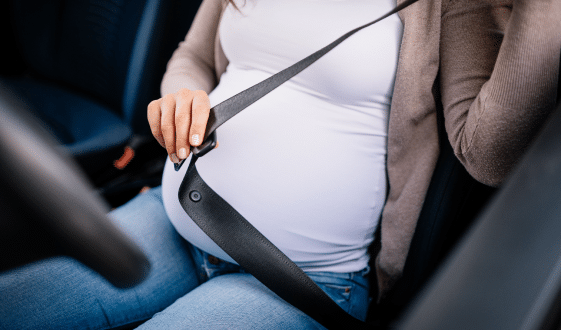
Legally Reviewed by:
Mark S. Gervelis, Esq.
Last Updated:
- October 29, 2025
From coffee to sushi to hot tubs, pregnant women have to give up many things. Traveling shouldn’t be off-limits, but is it safe to drive while pregnant?
In most cases, it’s safe to drive while pregnant. However, motor vehicle crashes injure more than 90,000 pregnant women every year, and some aspects of pregnancy make accidents more likely. If you’re pregnant, understanding the potential driving hazards and taking certain precautions can ensure you and your unborn baby arrive at your destination safely.
TABLE OF CONTENTS
- Important Points to Remember About Pregnant Driving
- Common Pregnancy Symptoms That Can Impact Driving
- Safety Tips for Driving While Pregnant
- When Should You Stop Driving When Pregnant?
- When Is It Safe To Drive After Giving Birth?
- Alternative Transportation Options for Pregnant Women
- Special Considerations When Driving Long Distances
- What Happens if I Get Into a Car Accident While Pregnant?
- Legal Options if You’re Involved in an Accident
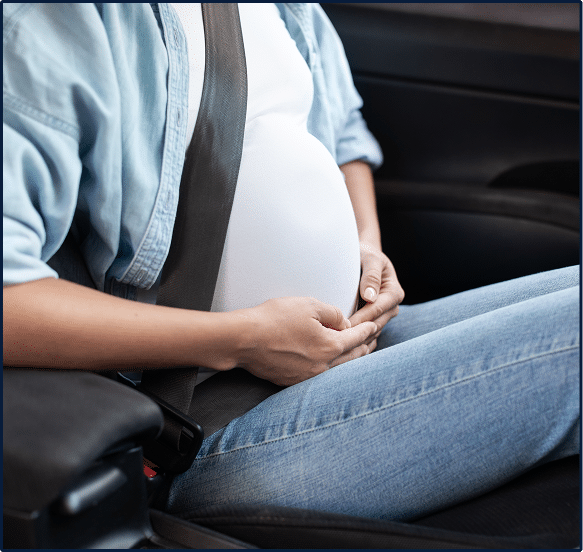
Important Points to Remember About Pregnant Driving
As an expectant mother, an accident poses heightened risks and could cause complications for your baby that lead to birth injuries. Therefore, you must measure how your physical symptoms through each stage of your pregnancy could affect your ability to drive.
According to a study published by the Canadian Medical Association Journal, women face a higher chance of motor vehicle crashes during their second trimester. Common symptoms during this stage, including fatigue and sleep deprivation, are likely the reasons. Driving during the third trimester becomes more difficult and uncomfortable as your belly grows.
Common Pregnancy Symptoms That Can Impact Driving
Pregnancy is physically taxing, with a wide range of effects on the body. These are the symptoms most likely to affect your driving:
- Fatigue: Hormone changes can make you feel tired, as can the additional weight you carry.
- Morning sickness: Many women experience vomiting and nausea, especially during their first trimester of pregnancy.
- Back pain and pelvic discomfort: As your uterus grows, it puts painful pressure on your ligaments and joints.
- Swelling and varicose veins: Increased blood volume and pressure on your major veins can cause significant swelling and enlarged blood vessels.
- Dizziness: Hormones, low blood sugar, and dropping blood pressure may cause you to feel lightheaded.
- Shortness of breath: Some women experience shortness of breath because of pressure on the lungs and a greater oxygen demand.
Experiencing one or more of these symptoms doesn’t mean it’s unsafe for you to drive, but they can interfere with your ability to drive safely if they become too frequent or severe.
Safety Tips for Driving While Pregnant
You can drive while pregnant while keeping down the risks for you and your unborn baby. Like driving with a disability, taking the right steps can lower the odds of an accident or health incident.
- Put on Your Seat Belt
Wearing a seat belt while pregnant is often uncomfortable, but it’s vital to always use one. For the best protection, buckle the belt below your belly with the shoulder belt across your chest. In addition, adjust your seat to maximize the distance between your belly and the steering wheel.
- Wear Comfortable Clothes
Tight clothes can limit your movement and make it more difficult to drive. Wear loose outfits without tight belts or waistbands, which can dig into your stomach. Choose your footwear carefully, especially if your feet and ankles swell, to maintain full control of the pedals.
- Eat and Drink Regularly
Pregnant bodies require more calories and hydration, so eat regular meals and drink plenty of fluids to boost your energy. Choose healthy snacks to regulate your blood sugar and prevent sudden dizziness or tiredness.
- Make Frequent Stops
Focusing on your driving isn’t easy when you’re dealing with an overfull bladder. Stop regularly so you’re at ease throughout the drive and to minimize the chance of blood clots. Deep vein thrombosis is potentially life-threatening, and getting out of the car to stretch your legs is one of the best prevention methods.
- Prepare for an Emergency
Pregnant women may need a few bonus items in their emergency bags. Consider carrying anti-nausea medications or wristbands, a portable battery pack for your phone, and a first aid kit for minor injuries. If you’re traveling a long distance, carry a hospital bag in case you go into labor.
- Avoid Unnecessary Hazards
Before a trip, check your vehicle to ensure it is in good working condition. If it needs maintenance, do not drive it. Avoid driving on expressways and highways, where crashes are often more severe due to high speeds.
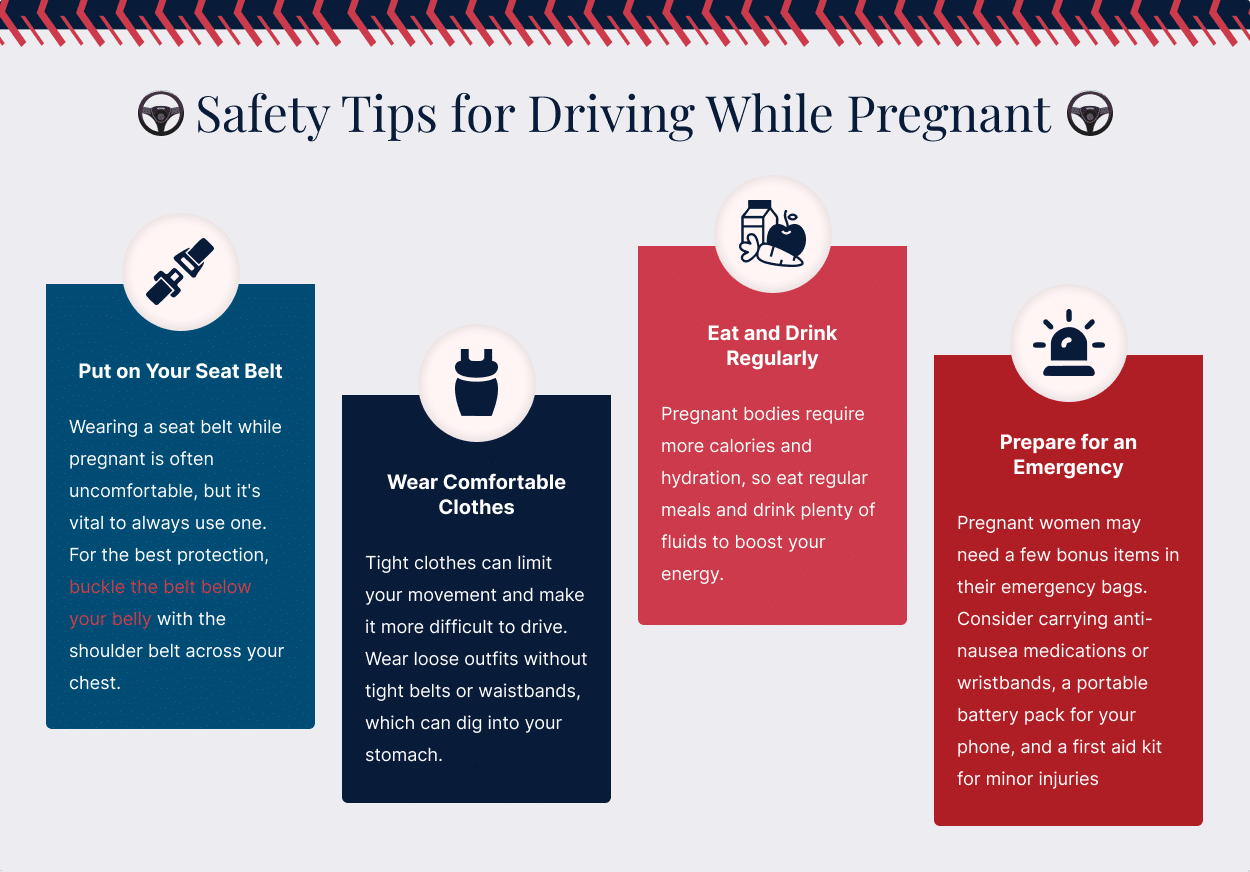

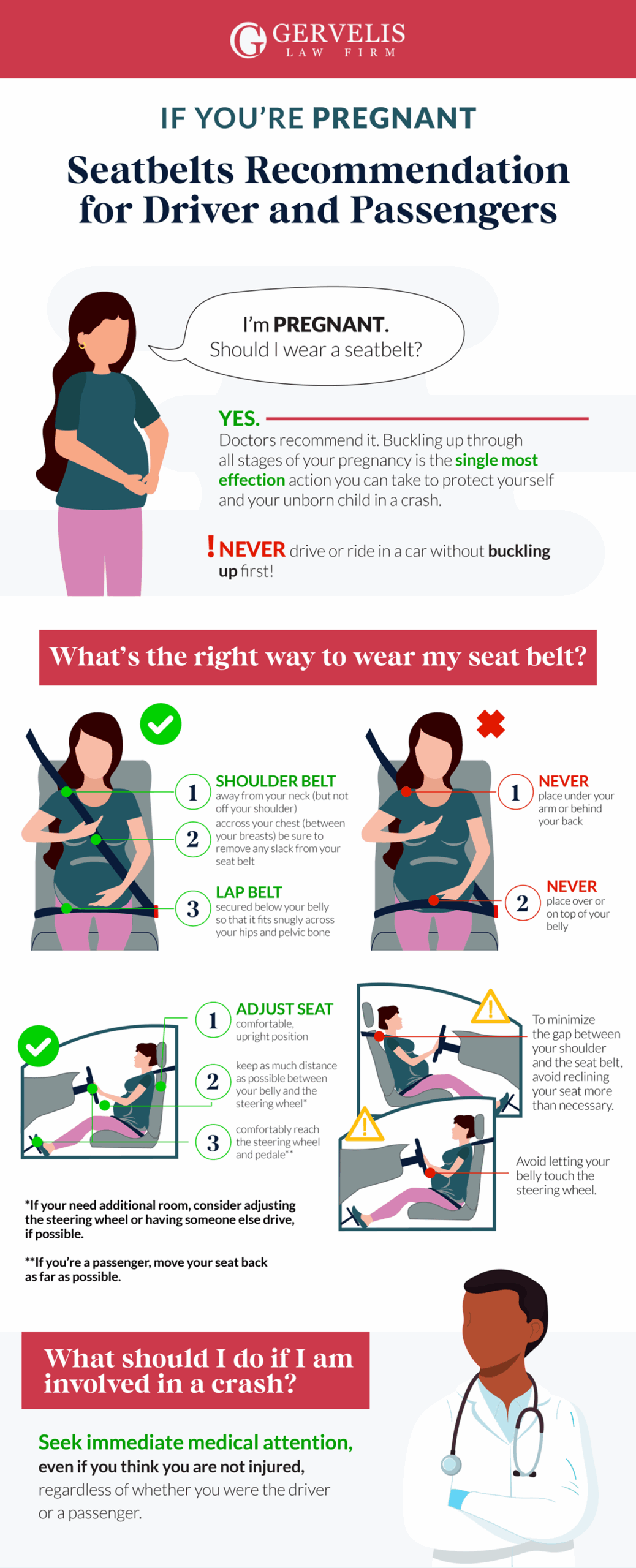
When Should You Stop Driving When Pregnant?
Some women can drive up until the day they give birth, while others have to stop weeks or even months before delivery. Every situation is unique, but certain circumstances during pregnancy may make it imperative to stay off the road.
Severe Pregnancy Symptoms
Driving is no longer safe if your symptoms become severe enough to impact your ability to concentrate or stay alert. Severe nausea or vomiting and extreme fatigue can make it difficult to focus on your speed, traffic, and other hazards. These symptoms often come with dizziness and lightheadedness, which make driving more dangerous.
High-Risk Pregnancy Conditions
According to the American College of Obstetricians and Gynecologists, driving and travel in general is unsafe for pregnant women with certain health conditions, such as the following:
- Gestational hypertension and preeclampsia: These conditions cause high blood pressure, and driving can worsen your symptoms.
- Gestational diabetes: Unstable blood sugar can make you lightheaded or disoriented.
- Pregnancy-related complications: Medical experts recommend against driving if you experience complications like preterm labor, vaginal bleeding, DVT, or ruptured membranes.
If you have a diagnosis for one of these conditions or suspect you might have one, don’t drive until you get a doctor’s go-ahead.
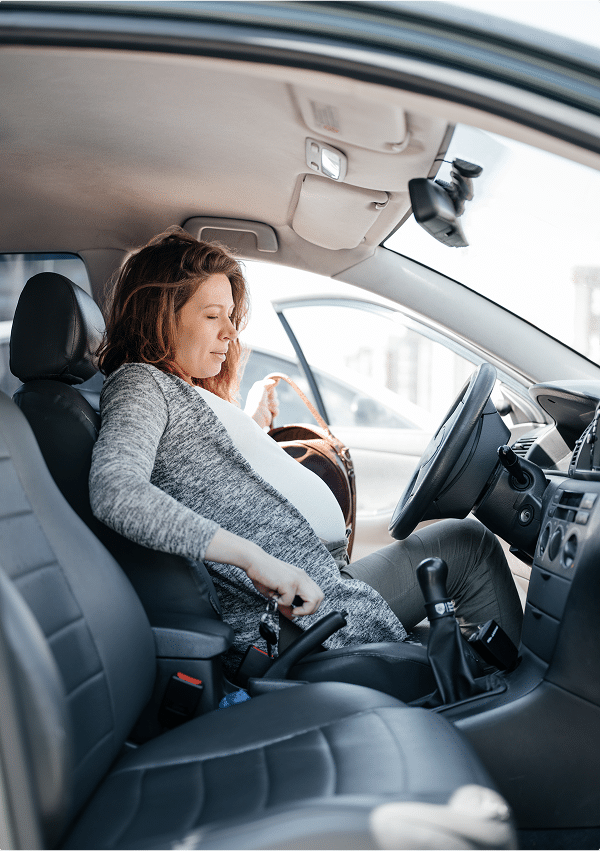

Third Trimester Discomfort
During the third trimester, some women move into positions to stay comfortable that may be unsafe while driving. If you have to sit sideways to relieve pressure, can’t turn to check your blind spot or look in your mirrors, or no longer fit comfortably behind the steering wheel, take a break from driving until after your baby is born. These seemingly minor issues can make it more difficult for you to operate the vehicle safely.
Professional Recommendations
When a health care provider recommends that you stop driving, take it seriously. If you’re unsure whether you can continue or are struggling to overcome driving anxiety, reach out to your doctor for advice.
When Is It Safe To Drive After Giving Birth?
Medical professionals generally recommend driving one to two weeks after a vaginal birth or two to three weeks after a C-section. However, your timeline will ultimately depend on your postpartum health and your doctor’s guidance. If you experienced any major complications during the birth, your recovery and ability to resume driving may take longer.
Alternative Transportation Options for Pregnant Women
You may not have the option or ability to drive while pregnant, but that doesn’t mean you must stay home. Explore other ways to get around, including the following:
- Ask for help: See if a family member, spouse, or partner can give you a ride. As an added bonus, someone will be there to help if you experience unexpected health concerns.
- Use a rideshare service: Booking a car to take you around town is especially convenient because you can reserve a ride through an app and wait for the driver to arrive at your door.
- Use public transportation: Taking a bus or subway means you won't have to worry about parking, and public transportation is 10 times safer than traveling by car.
If you prefer not to drive or are unable to because you’re too far along in your pregnancy, are experiencing complications, or have just given birth, don’t rush to get behind the wheel. These options allow you to safely go to work, doctor’s appointments, and the grocery store.
Special Considerations When Driving Long Distances
Road trips are possible while pregnant but might require some special preparation. Look at your route before you go, finding rest stops, hotels, and gas stations where you can rest, move around, and replenish your snack and water supply. If you’re taking any pregnancy-related medications, supplements, or vitamins, bring extra in case you’re on the road longer than you expect.
As for the trip’s timing, the American College of Obstetricians and Gynecologists recommends traveling between 14 and 28 weeks of pregnancy. After you enter the third trimester, many care providers suggest staying within 300 miles of your home.
Plan for safety by having a professional carefully inspect your vehicle before you go. If you take public transportation instead of driving, choose a comfortable seat, bring water and snacks, and find opportunities to stand and walk around to prevent DVT.
What Happens if I Get Into a Car Accident While Pregnant?
Car accidents during pregnancy can be terrifying because you’re concerned about the safety of your unborn child. If the worst happens and you’re in a crash, try to stay calm and take measures to protect yourself physically and financially.

What To Do After Your Accident
Your health is the first priority. If you’re bleeding or in pain, go to the emergency room for an immediate evaluation. Even if you don’t have visible symptoms, consult your health care provider as soon as possible.
Once you know you and your baby are well, try to document the accident. Take photographs of your injuries and the scene, speak to anyone who witnessed the events, and contact the police to file a report. In addition, reach out to a personal injury attorney for guidance on what to do next, including how to handle calls from insurance companies and whether to file a personal injury claim against the responsible party in the accident.
What Are Common Injuries for Pregnant Women Involved in an Accident?
According to a recent study, pregnant women are at significantly higher risk of suffering severe and mild injuries in car accidents compared to women who aren’t pregnant. Some issues you might develop include the following:
- Abdominal trauma
- Placental abruption
- Pelvic injuries
- Spinal injuries
- Concussions and traumatic brain injuries
- Internal bleeding
- Emotional and psychological impacts, including anxiety, depression, and post-traumatic stress disorder
These injuries are also dangerous for your baby because they can cause a ruptured uterus, a drop in fetal heart rate, or early delivery.
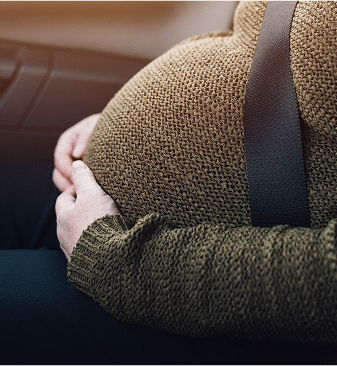
Legal Options if You're Involved in an Accident
Getting into an accident while pregnant can seriously harm you and your unborn child. If that happens, or if a birth injury occurs, Gervelis Law Firm can help you file a personal injury claim. A civil lawsuit allows you to hold the person responsible for your accident accountable and recover damages for your losses.
Call 866-792-2728 today or contact us online for a free consultation.
